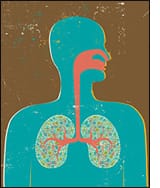The Department of Health has recently addressed the growing concern regarding respiratory illnesses, forecasting a significant increase in cases as the colder months approach. This announcement comes amid rising reports of illnesses such as influenza, pneumonia, and other respiratory infections, which tend to surge during the fall and winter seasons. Health officials are urging the public to take proactive measures to safeguard their health and the health of their communities.
Several factors contribute to the anticipated rise in respiratory illnesses. Seasonal changes often lead to increased indoor gatherings, where viruses can spread more easily. Additionally, the onset of colder weather can weaken the immune system, making individuals more susceptible to infections. The Department of Health has noted that the combination of these factors, along with the ongoing presence of COVID-19, creates a perfect storm for an increase in respiratory ailments.
In their statement, health officials highlighted the importance of vaccinations as a critical tool in combating respiratory illnesses. The flu vaccine, in particular, is recommended for everyone over six months of age, especially for those in high-risk groups such as the elderly, young children, and individuals with pre-existing health conditions. The department is working to ensure that vaccines are readily available and accessible to the public to encourage widespread participation.
Moreover, the Department of Health emphasizes the need for public awareness regarding the symptoms of respiratory illnesses. Common signs include coughing, difficulty breathing, fever, and fatigue. Early detection and prompt medical attention are crucial in managing these illnesses effectively. The department encourages individuals to seek medical advice if they experience any concerning symptoms, particularly if they belong to a vulnerable demographic.
In addition to vaccinations, the Department of Health advises the public to practice good hygiene to reduce the spread of respiratory infections. This includes regular handwashing, using hand sanitizers, and avoiding close contact with individuals who are sick. The importance of wearing masks in crowded or enclosed spaces has also been reiterated, especially during peak illness seasons. These preventive measures are vital in protecting not only individual health but also the health of the community at large.
The department is also closely monitoring trends in respiratory illnesses and is prepared to respond to any surges in cases. Public health officials are collaborating with healthcare providers to ensure that hospitals and clinics are equipped to handle an influx of patients if necessary. This proactive approach aims to minimize the impact of respiratory illnesses on the healthcare system and ensure that individuals receive the care they need in a timely manner.
As the Department of Health continues to prepare for the upcoming months, they are committed to keeping the public informed. Regular updates regarding vaccination availability, health guidelines, and emerging trends in respiratory illnesses will be communicated through various channels, including social media, press releases, and community outreach programs. The department encourages individuals to stay informed and participate in public health initiatives designed to combat respiratory illnesses.
In conclusion, the Department of Health’s announcement regarding the expected rise in respiratory illnesses serves as a reminder of the importance of vigilance during the colder months. By taking preventive measures, such as getting vaccinated and practicing good hygiene, individuals can play a crucial role in protecting their health and the health of those around them. The department remains dedicated to providing resources and support to ensure the well-being of the community as it navigates this challenging season.


